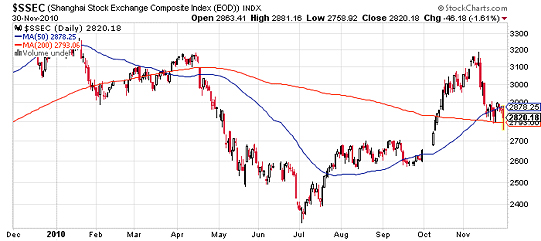Smart Gold, Dumb Bankers
Physical Gold Investment demand is adding to the Eurozone debt crisis bid...
PROBABLY keep your mouth shut and lay low and try not to get yourself killed, writes Dan Denning in his Daily Reckoning Australia.
That's what you should do if you find yourself confronted with a belligerent and powerful enemy who's bent on destroying you but is currently engaged in internal quarrelling and self destruction.
See? We told you gold was smart.
Gold Futures closed up again last night in New York. The big driver is still the uncertainty about what will happen with Europe's ongoing, never ending, this-can-only-end-badly Sovereign debt crisis. But don't forget another important driver for gold and precious metals in general: physical demand!
"China's securities regulators have given the go ahead for a mutual fund to invest in foreign exchange-traded gold funds, potentially tapping interest among mainland China investors who face negative real interest rates on their bank deposits and want to hedge against inflation," reports Marketwatch.
With one-year bank deposits yielding 2.5% and the official inflation rate at 4.4%, you can see why a saver in China would want to get out of cash and into something like gold, stocks, or property.
The trouble is that two of those three options listed above are currently getting smashed in China. China's Shanghai Composite Index fell 1.6% yesterday. You can see from the chart below that the index is back where it was in early October after a powerful move up. A hike in interest rates to (hopefully) contain inflation was expected over the weekend but didn't arrive.

We've been catching up the last few days on the Shanghai and Hong Kong property markets. Of course there's a lot we don't know about the real estate market in China. For example, it might be normal to speculate on house prices in China, as it is here in Australia. There are cultural attitudes to certain asset classes that foreigners sometimes just don't understand (or see more clearly than locals).
On the other hand, if you're a loud-mouthed American or just believe there's plenty of evidence that China is in the grip of a credit bubble, AND you have a $1.6 million Aussie Dollars to put your money where your mouth is, you can sign up for Mark Hart's hedge fund betting on the imminent implosion of China.
Hart reckons China has consumed only 65% of the cement it's produced in the last five years. And more worrying for Australia, he says China has 200 million tonnes of excess steel capacity (more than the total production of the EU and Japan combined). He also reckons there's 3.3 billion square metres of excess floor space and that there's an enormous property bubble in China, with the average price-to-rent ratio in China's eight key cities just under 40.
This would correspond to the idea that there's a fixed asset boom in China being driven by reckless lending, an obsession with GDP growth figures by local governments (with dubious financing schemes), and a good old fashioned speculative frenzy in property. It would also mean those glowing terms of trade Greg Canavan mentioned yesterday at The Daily Reckoning Australia are, in fact, one-offs and not a permanent feature of the Australian economic landscape.
If China's going down, it's going to take a heaping helping of iron ore companies with it. But that in itself might cause a re-allocation of institutional assets in Australia that would benefit other sectors, even if it was grim news for the miners.
Of course maybe Hart is wrong and we – like Gold Bullion – are just idiots. Time will tell. China certainly has one big thing going for it: it's not Spain.
Spain is a very nice place, mind you, with beautiful churches and bullfights and afternoon naps. But right now it finds itself at the centre of Europe's sovereign debt crisis. Bloomberg reports that yields on ten-year Spanish debt no yield nearly 3% more than ten-year German bonds. "Ireland's bailout did nothing to ease the euro-zone debt crisis: it might have even made it worse," says Standard Bank strategist Steven Barrow.
The last think you probably want to read about is rising bond spreads in Europe. We know, because we just finished writing about them in yesterday in the monthly issue of the Australian Wealth Gameplan. The takeaway? Europe's bond crisis is an existential crisis for European Federalism.
That may or may not be an interesting idea (depending on how much you like history and geopolitics). If you believe there's a connection between modern State finance and the reach and scope of government in public and private life, then Europe's crisis (and America's and Japan's) is really a crisis for the Nation State and its ability to deal with globalization and trans-national bankers.
But what, if anything, does it have to do with Australia? And should it interrupt our enjoyment of the cricket, the spring, and beer?
Two words dear reader: capital flows. Stay tuned.
Buy Gold and physical Silver Bullion at live spot-market prices only at BullionVault now...












 Email us
Email us
